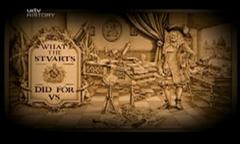What the Stuarts Did for Us
| What the Stuarts Did for Us | |
|---|---|
 |
|
| Genre | Documentary |
| Presented by | Adam Hart-Davis |
| Composer(s) | David Mitcham |
| Country of origin | United Kingdom |
| Original language(s) | English |
| No. of series | 1 |
| No. of episodes | 4 |
| Production | |
| Producer(s) | Paul King |
| Editor(s) | Maggie Ward |
| Running time | 23 minutes |
| Distributor | BBC |
| Release | |
| Original network | BBC Two |
| Picture format | 16:9 576i |
| Audio format | Stereo |
| Original release | 21 October – 11 November 2002 |
| Chronology | |
| Preceded by | What the Tudors Did for Us |
| Followed by | What the Industrial Revolution Did for Us |
| External links | |
| Website | |
What the Stuarts Did for Us is a 2002 BBC documentary series that examines the impact of the Stuart period on modern society.
In the beginning of the Stuart Period a curious new device appeared, it looks like a church bell but in fact it's an exercise machine. This machine was one of many trendy new ideas that enhanced the life style of the Stuarts. It was the beginning of designer living.
Hart-Davis travels around Britain to introduce the idea and inventions of the Stuart Period in architecture and life-style.
Before Stuart times the man who really ruled the scientific roost was the Greek philosopher Aristotle, even if he had been dead for 2000 years. But by the 1600s his ideas were becoming discredited and the Stuarts needed a new approach to understanding nature.
Hart-Davis travels around Britain to introduce the idea and inventions of the Stuart Period in science and engineering.
Travel by coach was all the rage for the Stuarts and once regular public transport had filled the road with traffic, thieves like Moll [Cutpurse] were guaranteed a regular income. She was just one entrepreneur profiting from a Britain that was more organised than ever before.
Hart-Davis travels around Britain to introduce the idea and inventions of the Stuart Period in economics and politics.
In a Dutch spectacle shop a chap called Zacharias Jantzen looked through two lenses at once and got the shock of his life, he was seeing the world in super-close-up. Jantzen had made the first microscope, giving the Stuarts a window into an entirely new miniature world.
Hart-Davis travels around Britain to introduce the idea and inventions of the Stuart Period in science and science-fiction.
...
Wikipedia
